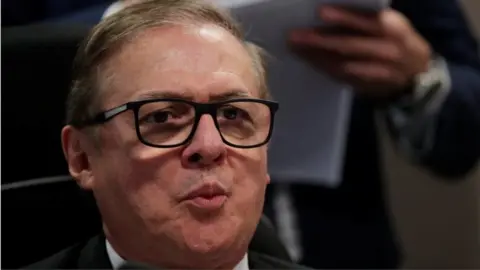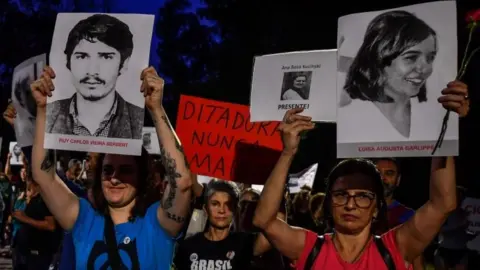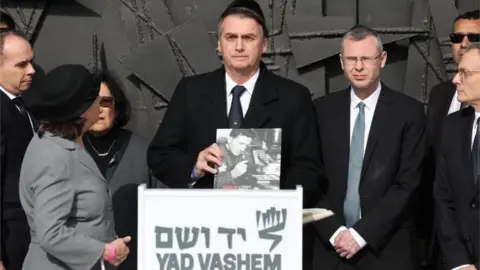Brazil textbooks 'to be revised to deny 1964 coup'
 Reuters
ReutersBrazil's Education Minister Ricardo Vélez says school textbooks will be revised so that children are taught "a wider version of history".
Mr Vélez denies that the 1964 military ousting of democratically elected President João Goulart was a coup.
He also refers to the 21 years of military rule which followed as "a democratic regime by force".
His comments come days after far-right President Jair Bolsonaro announced the coup's anniversary would be celebrated.
'Institutional shift' or coup
Mr Vélez told news magazine Valor Económico that school textbooks should "rescue the vision" of the events in 1964 so children could develop a "true and real idea" of what happened.
 AFP
AFP"Brazilian history shows that what happened on 31 March 1964 was a sovereign decision by Brazilian society," he told Valor Económico [in Portuguese].
While President Goulart was deposed without blood being shed on the night of 31 March 1964, the 21 years of military rule which followed were marked by brutal repression and heavy censorship.

Read more:

More than 400 people disappeared or were killed, and thousands more were detained and tortured before democracy was restored in 1985, according to the findings of a 2014 national truth commission.
Mr Vélez described military rule as "a democratic regime by force which was necessary at the time" and said the toppling of President Goulart was "an institutional shift, not a coup against the constitution at the time".
He said there would be a "progressive shift" in school textbooks to reflect "a wider version of history".
The president of the Brazilian Association of Textbooks, Cândido Grangeiro, was critical of Mr Vélez's plan, saying that any changes to didactic material were as a rule based on wide academic research and not on opinions.
He said his organisation was "opposed to any type of revisionism based on opinions".
'Nazis were leftists'
It is not the first time the government of President Bolsonaro has been accused of revisionism.
 EPA
EPAThe president himself caused outrage earlier this week when he echoed comments made by his Foreign Minister Ernesto Araújo, who described Nazism as a leftist movement.
Asked by reporters following a visit to the Yad Vashem Holocaust memorial and museum in Israel whether he agreed with Mr Araújo comments, Mr Bolsonaro answered "There is no doubt, right?"
He said that the name of the Nazi party was National Socialist Party of Germany, implying that it had a socialist ideology.
His statement contradicted the information inside the museum he had just visited, which says that Nazism arose from radical right-wing groups in Germany angered by the rise of communism.
